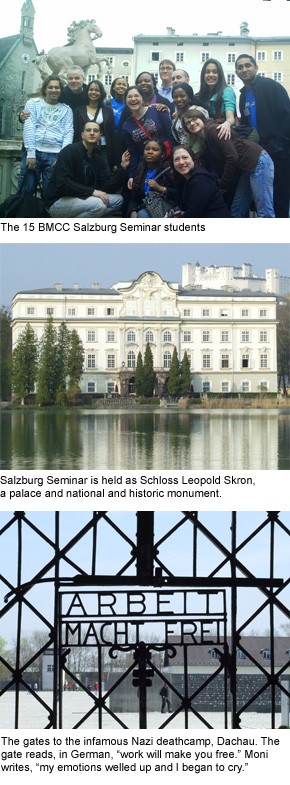
Moni is a 26 year old BMCC student, who is originally from Germany, wrote a blog of her week-long experiences at the Global Issues Seminar in Salzburg, Austria, from April 2-9. She and 14 other BMCC students were there to understand America’s place in the world and to appreciate how non-Americans perceive the U.S.
Moni Woweries who is a Liberal Arts major and intends to transfer to Hunter College in the fall as a Political Science major, also has a wide interest in the arts and sciences too. She along with Marie Aurelien, Ksenia Avezov, Kenneth Brown, Funda Erparlak, Lesa Graham, Christopher Iverson, Kimberly LaForce, Phillip Lentz, Zaid Merhom, Olapeju Olasokan, Roberto Santiago, Sharon Sattaur, Sandra Seifert, and Shiraz Yar were selected for the third BMCC Salzburg Seminar.
Founded in 1947 by three Harvard students, the Salzburg Seminar has brought more than 25,000 Fellows from 150 countries to its programs. Conducted at Schloss Leopoldskron, a palace and national historic monument in Leopoldskron-Moos, a southern district of the city of Salzburg and at other partnering venues around the world, seminar participants are asked to consider the political, economic and cultural history of the trans-Atlantic relationship, its future dimensions, and the impact changes to this relationship may have on the rest of the world.
The Salzburg seminar also asks participants to examine issues of concern to regions of the developing world, the historical legacy of the latter part of the 20th century, global responsibility, humanitarian intervention, and social justice.
Advancements in technology are enabling the Seminar to extend the impacts of all its programs by facilitating the ongoing exchange of professional experience and ideas among its global community of alumni. Seminar participants are asked to keep a blog of their experiences and with Moni’s permission, her blog is the basis of our story.
Before leaving for Salzburg, Moni talks about the competitive process of selection and what she learned from BMCC Salzburg alumni. “I found out that initially around 70 people applied for the seminar at BMCC out of which 30 were chosen to interview. Then, over two –and- a- half days of interviewing, the 15 finalists were picked.”
“At our last workshop Dean Craig invited some former attendees to speak to us about their experience. Sabine, whom I recognized from my first semester Philosophy class, said that she had been at a crossroads before attending the seminar. She encouraged us to talk to the professors and make connections. Many of them said that it was an emotional, eye-opening time.”
“Graham said that his experience was like a painting: You attempt to look at small beautiful parts but realize that in its entirety can it only be fully appreciated. Ilva added, that in order to change the world today one must understand how international organizations work. Just to see the magnitude of the change Salzburg had on her, she told us how she was now studying International Studies with a focus on Green Architecture. Everyone agreed on one thing: Be open-minded.”
At Salzburg, Moni met a wide array of people who were not exactly in love with the United States and its foreign policy, but as she admits, it had its merits. “We did tell them to be completely honest, and despite knowing what Europe thinks of the U.S. and despite being a German living in the U.S., in a way it hurt and it was hard to listen to. I guess it is very different from knowing it subconsciously and actually being confronting with it. It was an amazing conversation though, and we talked about many other things such as a difference in legal systems (lack of a jury and no case law), the media portrayal of America and 9/11 and about the film industry.”
In her April 5 blog where she and the other BMCC students visited Dachau, the infamous Nazi death camp, Moni’s blogs are profound and deeply moving. They are, in essence, the great eye-opener of the seminar.
Moni writes, “I’ve done so much research about genocide and read and learned about other instances of incredible cruelty, so in a weird way going to Dachau seemed like nothing much more than repeating old history to me.”
“We got back on the bus. I talked about other things, not Dachau. The girls next to me talked about other things, not Dachau. It was odd, to say the least… Then, we had the fireside talk. It was unstructured, and people were invited to share comments or ask questions. The emotions began, and I realized that I began to be affected. I even felt like crying at one point. I meant to say something, but since I don’t have the guts to keep my hand up sometimes I gave up after a few failed attempts. I did start to notice that what I had anticipated to feel at the camp I began to feel now.”
Summing up her week in Salzburg, Moni writes, “It’s been amazing, to say the least. I feel too exhausted and drained to actually express everything that I feel and that I’ve learned. It’s almost overwhelming. I guess the biggest lesson since we were such a mixed group is that it is possible to get along, be friends, and respect each other, no matter the difference of opinion. I became friends with some amazing people this week. It’s like one of the speakers said, I’m not sure I remember exactly who, but if people get to really know you, they’ll look beyond your skin color and begin to see you as a person. Skin color can be replaced by any other distracting, irrelevant prejudice that stands in the way when people communicate.”
Read more about Moni’s experiences at Dachau and at the seminar

